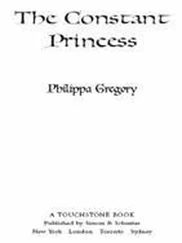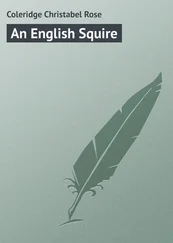Christabel Coleridge - The Constant Prince
Здесь есть возможность читать онлайн «Christabel Coleridge - The Constant Prince» — ознакомительный отрывок электронной книги совершенно бесплатно, а после прочтения отрывка купить полную версию. В некоторых случаях можно слушать аудио, скачать через торрент в формате fb2 и присутствует краткое содержание. Жанр: foreign_prose, на английском языке. Описание произведения, (предисловие) а так же отзывы посетителей доступны на портале библиотеки ЛибКат.
- Название:The Constant Prince
- Автор:
- Жанр:
- Год:неизвестен
- ISBN:нет данных
- Рейтинг книги:4 / 5. Голосов: 1
-
Избранное:Добавить в избранное
- Отзывы:
-
Ваша оценка:
- 80
- 1
- 2
- 3
- 4
- 5
The Constant Prince: краткое содержание, описание и аннотация
Предлагаем к чтению аннотацию, описание, краткое содержание или предисловие (зависит от того, что написал сам автор книги «The Constant Prince»). Если вы не нашли необходимую информацию о книге — напишите в комментариях, мы постараемся отыскать её.
The Constant Prince — читать онлайн ознакомительный отрывок
Ниже представлен текст книги, разбитый по страницам. Система сохранения места последней прочитанной страницы, позволяет с удобством читать онлайн бесплатно книгу «The Constant Prince», без необходимости каждый раз заново искать на чём Вы остановились. Поставьте закладку, и сможете в любой момент перейти на страницу, на которой закончили чтение.
Интервал:
Закладка:
“What news; what news?” shouted Joao, pressing before captain and chaplains, and nearly throwing himself overboard in his eagerness.
“Good news, my lord,” said the young squire, as he came up the side of the ship. “The town is taken, the fortress is yielding to the attack. The King, your father, bids me summon you and my lord Dom Fernando to his presence, as he is now in a place of safety, and would that you should see how towns are won.”
“And the Infantes?” said Fernando as he prepared eagerly to obey the summons.
“They have shown courage worthy of their name, in particular my lord Dom Enrique, to whom, in great part, this happy result is owing.”
The young princes were taken by a strong guard through the half-conquered city, for on the outskirts the battle still continued, or rather the Portuguese soldiers were still engaged in completing their conquest. The wonderful architecture, with its splendid colouring of red, blue, and gold all blazing in the hot light of an August sun against a sapphire sky, astounded the Portuguese princes, in whose native country the Moors had left no trace. All along the streets as they passed lay the bodies of the slain, Christian and Infidel side by side, while here and there frightful groans were uttered. Most of the inhabitants had fled or hidden themselves; but by chance a face scowled at the new-comers from the windows, and once they passed a group of dark-skinned, strangely-attired children, who were uttering in their unknown language griefs which needed no interpretation.
“We will make them Christians,” thought Fernando, as he shrank a little from the terrible sights around him, through all the thrill of triumph.
They were taken to a mosque in the middle of the town, where their father, in full armour, was seated, receiving reports and giving orders to his different captains. Duarte was standing behind his father’s chair; he looked grave and troubled. The King made a sign to the boys to wait while he listened to Dom Pedro, who was speaking to him.
“And so, sire, we fear my brother must have been surrounded, and his retreat cut off. Duarte and I have endeavoured to show ourselves worthy to be your sons, but Enrique – ”
Pedro paused, and Duarte added with a faltering voice, “It was he who forced a way into the town and beat back the enemy. If we have lost him, would the victory were a defeat?”
The King’s face was pale as when he had stood by the death-bed of his beloved wife, but he answered firmly, “My sons, this is the fortune of war. If my son Dom Enrique has fallen, he has fallen as becomes a Christian prince. Weep not for him, but see that we make sure of that which we have gained, and to-morrow shall the traces of the accursed worship be removed from this mosque. And in a Christian temple will I give you the knighthood you have so nobly won. And for my son Enrique there is a martyr’s crown.”
Many and many a time had Fernando, in daydreams and fancies, pictured to himself the fall of Ceuta. He had seen his brothers triumphant in the fresh honours of their knighthood, had heard the Infidel city proclaimed the property of Christ and of His Church, seen the Cross raised and the Crescent cast down. And now these things had come to pass, and for him, instead of joy and triumph, were grief and sorrow of heart. Ceuta was Christian, but Enrique was dead! This was the cost of the victory!
Probably, if the alarm had arisen earlier, the boys would not have been sent for into the city; but now their father welcomed them with the same stern self-control, and bid them listen to the orders he gave, and hear of their brothers’ prowess. Nothing would ordinarily have pleased them better; and the excitement and novelty prevented Joao from realising their loss. Fernando stood still, pale and silent, till the ever-kind Duarte, in a pause of the arrangements, beckoned him up to his side and put his arm round him, and Fernando knew by the grasp of Duarte’s hand that he was quite as unhappy as himself. How long this lasted Fernando could not tell; he felt as if it was a whole day since he came into the city, but it could not have been much more than an hour, for the sun had not yet gone down, when there was a great shouting among the soldiers who were guarding the mosque without, the door was flung back, and Enrique, alive and unhurt, came hurriedly in and dropped on his knees before his father.
“My father, I grieve to have alarmed you, but I and my troop were surrounded in a mosque at the farther end of the town, and had much ado to cut our way out. We have now crushed the last efforts at resistance; the town is ours by the grace and mercy of God, we can offer what terms we will.”
There was no drawback now to the joy of victory. The King and his sons embraced Enrique, and presently a messenger was sent to demand the surrender of the fortress where Zala-ben-Zala with the remnant of his troops had taken refuge, and, after some delay, terms for its delivery on the next morning were agreed upon. The inhabitants of Ceuta were to be offered the choice of leaving the city or of submitting to the Christian rule. The mosques were to be turned into Christian churches, a Bishop to be appointed, and every effort made to induce the people to adopt the faith of their conquerors, which faith the Portuguese princes were too high-minded and far-seeing to discredit by permitting cruelty, plunder, or rapine to their troops, as was too often done in like circumstances.
So all was quiet and orderly when the sun went down, and the King retired to rest in a house near the central mosque, taking his two younger sons with him, while the other princes occupied themselves in the disposal of the troops.
Chapter Six
The Captured City
“Where bells make Catholic the trembling air.”
Royal prince though he was, Fernando had never slept under such embroidered coverlets, nor seen such hangings of gold and silver, such carving and fretwork, as met his waking eyes in the dawn of the new day. The horseshoe arch of the window framed a piece of deep blue sky, against which a gilded dome, surmounted by a crescent, glittered in the morning sun.
Fernando sat upright and devoutly crossed himself, with a thrill of joy, as he thought how soon that symbol of evil would give place to the golden cross brought with them so carefully from Lisbon for the purpose. Presently he became aware that Enrique, still fully dressed but with the heavier parts of his armour removed, was lying asleep near the window, his long limbs extended on a coverlet of pink and silver, as if he had thrown himself down, wearied with his day of fighting. As Fernando looked round the room he heard an extraordinary chattering and screaming, a noise quite unknown to him, and, not having any confidence in the character of his surroundings, he began to feel frightened. What powers of evil might not lurk amid those unnatural splendours! Joao was in the next room, and Enrique slept through the increasing clatter, which actually sounded like spoken words in an unknown tongue; and yes, a peal of horrible mocking laughter apparently just over his head.
Fernando could bear it no longer. He jumped up and seized his brother’s arm.
“Enrique – Enrique, wake up! I think the foul fiend is in this room?”
“Fernando, hark! there is some Moorish devilry here!” and Joao, looking quite pale with alarm, peeped out of the inside chamber, then fled to Enrique as a refuge. The latter awoke, considerably surprised to feel his little brothers pulling at each arm, and as they had considered it their duty, as soldiers in war-time, to go to bed in their clothes, with their long hair rumpled and their dress disordered, they presented rather a startling aspect.
“What ails you both?” cried Enrique.
“Enrique, listen! it is certainly the devil.”
Читать дальшеИнтервал:
Закладка:
Похожие книги на «The Constant Prince»
Представляем Вашему вниманию похожие книги на «The Constant Prince» списком для выбора. Мы отобрали схожую по названию и смыслу литературу в надежде предоставить читателям больше вариантов отыскать новые, интересные, ещё непрочитанные произведения.
Обсуждение, отзывы о книге «The Constant Prince» и просто собственные мнения читателей. Оставьте ваши комментарии, напишите, что Вы думаете о произведении, его смысле или главных героях. Укажите что конкретно понравилось, а что нет, и почему Вы так считаете.












